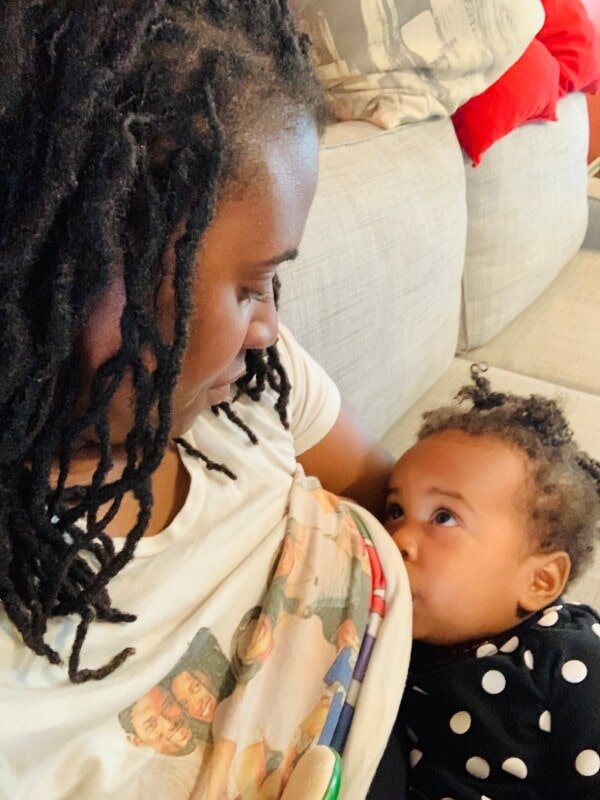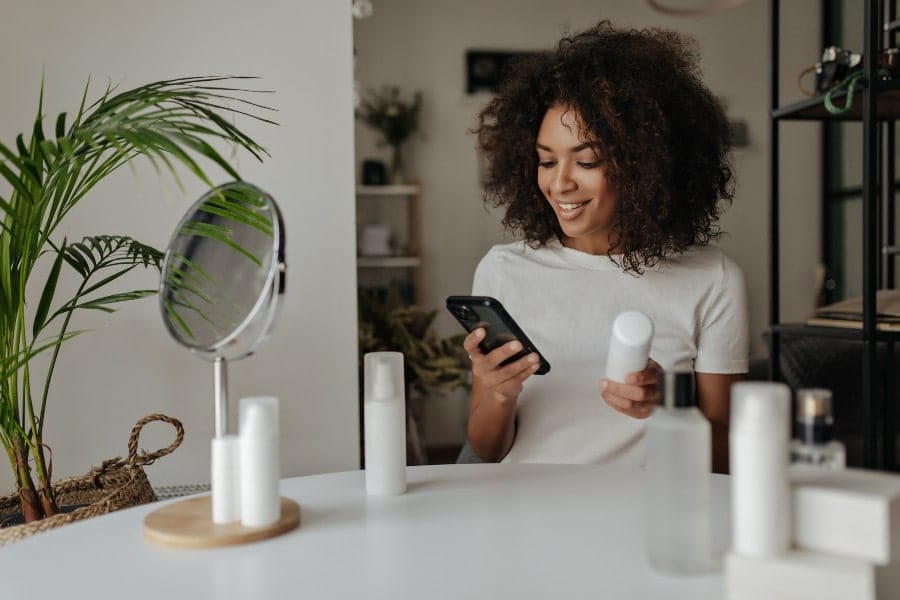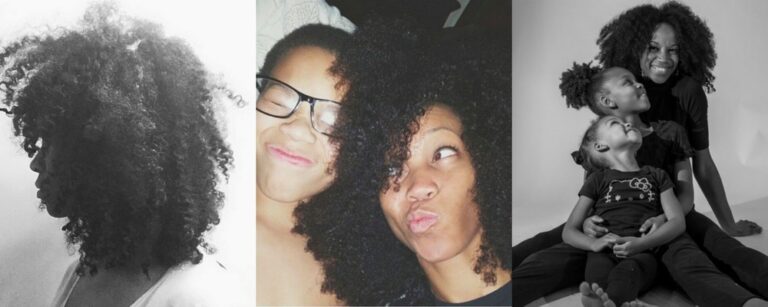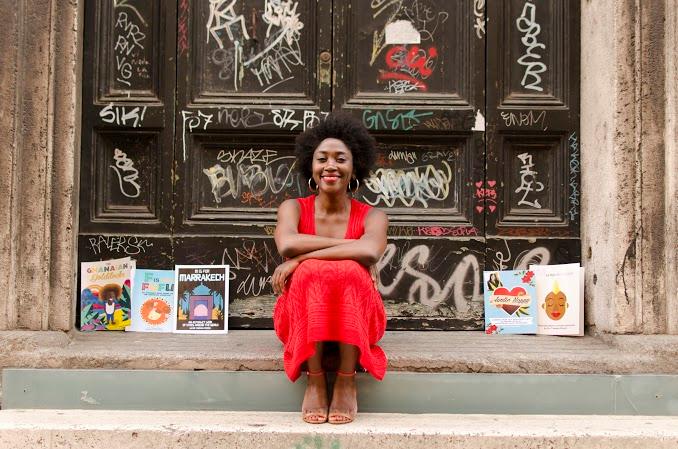So much of being a mom is making choices that not only ensure your safety, but that of your children’s. And as a Black mom, those choices often come stacked against you and your family’s favor.
Take skincare and beauty products, for instance.
Picking a product should be as simple as “I like the packaging” or “This product works for me.”
But for Black women, choosing personal care products is a healthcare decision.
Why?
Because many of the beauty and hair products we use are packed with toxic chemicals that have been linked to our higher breast cancer mortality rates, and our higher instances of infertility, reproductive disorders, and preterm births, among other serious health concerns.

Wait, What?
It’s upsetting, and true: Research shows that products marketed to Black women are more likely to be toxic. (For example, Johnson & Johnson’s baby powder was “aggressively marketed” to Black mothers for decades even though the company knew talc was carcinogenic.)
Since Black women over-index on spending in “ethnic hair care and beauty,” according to a 2017 Nielsen report, it means we’ve been disproportionately exposed to dangerous chemicals for much of our lives compared to women of other races.
Black women are overexposed and underprotected from toxic chemicals.
—Janet Robinson Flint, executive director of Black Women for Wellness
According to the Environmental Working Group (EWG), one in 12 beauty products made for Black women contains “highly hazardous ingredients.” And of the more than 1,100 products tested, “less than a quarter” were considered low-risk, compared to “40% of products that are marketed to the general public,” CNN reported.
One of the biggest culprits is haircare products. Hair relaxers, coloring dyes, lotions, and bleaching products are some of the worst products for our bodies because they contain a higher percentage of endocrine-disrupting chemicals (EDCs) like parabens and phthalates. (Endocrine is an important hormone responsible for so much of how our bodies operate—more on that later.)
Nneka Leiba, director of the EWG’s Healthy Living Science Program, explained to Goop that hair-care product formulations are different to account for differences in hair texture. But these “differences” lead to poorer health outcomes for one group over the other.
This is in addition to our higher likelihood of being exposed to pollutants due to “environmental racism” (e.g. being segregated into neighborhoods that are next to busy highways, landfills, or factories).
To put it simply, as Janet Robinson Flint, the executive director of Black Women for Wellness said, “Black women are overexposed and underprotected from toxic chemicals.”

Carrying the Burden
With such consistent exposure to toxic chemicals, Black women have a higher “body burden” or “toxic load.” (Body burden is defined as “the total amount of a contaminant in the body,” according to the U.S. Environmental Protection Agency.)
The EDCs found in beauty products can make typical body functions go haywire, according to the EWG:
“There is no end to the tricks that endocrine disruptors can play on our bodies: increasing production of certain hormones; decreasing production of others; imitating hormones; turning one hormone into another; interfering with hormone signaling; telling cells to die prematurely; competing with essential nutrients; binding to essential hormones; accumulating in organs that produce hormones.”
This makes Black women more susceptible to:
- cancers (e.g. breast and ovarian)
- obesity
- asthma
- early menopause
- reduced muscle mass
- reproductive disorders (e.g. fibroids and early onset puberty)
- chronic diseases (e.g. lupus)
- preterm labor and birth
- low birth weight
- birth defects
And what’s more, these chemicals give our children an unfortunate head start in the toxic load race.

A Toxic Cycle
Pregnant women are often told to start thinking about what they’re passing to their babies through what they eat and drink. But our skin never stops absorbing the products we put on it—and that means our babies are exposed, too.
A small study conducted by the EWG in 2005 detected hundreds of toxic chemicals in newborns’ umbilical cord blood. This included known carcinogens and chemicals “toxic to the brain and nervous system.”
Babies are 10 times more susceptible to chemicals in products than adults.
The exposures pack on once they’ve arrived. There’s skin-to-skin contact when you first meet your baby, and then breastfeeding. And while all parents hope that “baby-safe” products are what they claim, “the average child is exposed through body care products to 27 chemicals a day that have not been found safe for children, including some associated with cancer, brain and nervous system damage, allergies, and hormone disruption,” the EWG reported in its most recent study on the matter.
Babies and young children are extremely vulnerable to these toxins because their skin is thinner and absorbs more of what comes into contact with it. And because of this, the EPA states that babies are 10 times more susceptible to chemicals in products than adults.
The cycle of poor health outcomes continues as well, the EWG discovered in its umbilical cord blood study.
“Remarkably, it appears that early life exposures can lead to health problems not only in adulthood, but also down through subsequent generations,” the report stated. “For instance, adult diseases linked to newborns’ low birth weight … cause adverse effects not only in those babies born small, but also in their children of any birth size, through heritable changes in gene expression that result in a phenomenon known as ‘epigenetic inheritance.’”
But this is an inheritance we can refuse to pass down.

Breaking the Cycle
With so many toxin-packed skincare and personal care items on the market targeting us and our family, choosing all-natural and organic options when possible helps reduce our exposure to these chemicals.
Truly clean beauty products have certifications and accolades that let you know they’ve been vetted to assure your safety. There are many, but four to look out for are:
- EWG Verified
- Made Safe
- USDA Certified Biobased Product
- Think Dirty’s Dirty Thinker’s Choice Award
One of the brands that we trust is —they’re vetted by these very key third-party watchdog organizations.
When in doubt use products that are paraben, phthalate, and fragrance free, and plant-based or organic. Knowing the cosmetic ingredients that make up EWG’s Toxic 20 list helps, too. The EWG also created a database called Skin Deep to assess products targeted towards Black people to evaluate their risks and dangers.
The products you choose to put on your and your family’s skin is just one of the many important choices you make as a mom.
Being a savvier consumer is definitely a privilege: It’s unfortunate that these choices aren’t a given, that we have to be so intentional. But until industries and policies get on the right side of history, those of us with the privilege and knowledge to do so can make better choices.

















